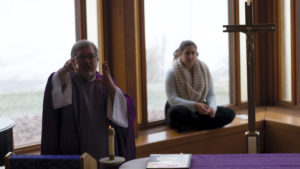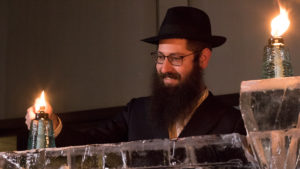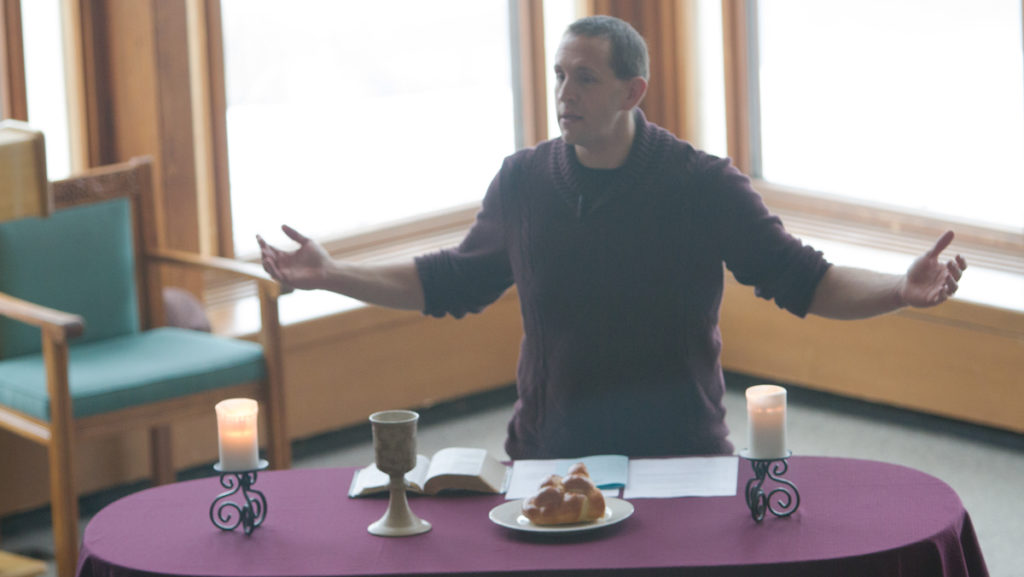The glow of two burning candles reflects off of the back window of Muller Chapel. Voices sing and recite prayers in both Hebrew and English.
It’s Friday evening, and members of Hillel, the Jewish community at Ithaca College, are observing Shabbat through a short prayer service followed by a dinner. They have invited new guests — members of the college’s small but growing Muslim community.
Sophomore Syed Fardin Ahmed is a member of the Muslim community. He and his friend, senior Joseph Fenning, attended the Shabbat service to work on uniting the two faith groups.
“It was like a whole new experience; I really loved it,” Ahmed said. “As I heard the songs, I felt this feeling of purity. I felt like being a part of a community helped a lot. The main reason we came today was to integrate Hillel with the Muslim community.”
A Pew Research study from 2015 indicates millennials are much less likely to identify with religion than their older counterparts. In the baby boomer population, between ages 53 and 71, 59 percent of people responded they found religion to be very important. Only 38 percent of younger millennials, between the ages of 21 and 27, responded they found religion to be important. However, students in various faith groups at the college are finding a strong community identity through their spirituality.
A Sense of Community
Senior Abrey Feliccia said she did not practice Catholicism much growing up, but she is now the president of the Catholic community at the college.
Feliccia said her interest in the Catholic community began during her freshman year at the college, when a friend invited her to attend a Thursday night Fireside Mass at the chapel.
“That really was the first time I had been to Mass in a really long time,” Feliccia said. “Everyone seemed to really be happy and kind of living out what they were preaching and what they believed.”

John Morton, campus ministry associate, said many students join faith groups on campus because they offer the strong sense of community many young adults search for, especially when entering college. He said there are about 100 registered members of the Catholic community on campus.
Morton said catering to students’ desires to form relationships around common beliefs helps them to make the decision to continue to practice their faiths.
Rachel Wagner, associate professor in the Department of Philosophy and Religion, said community is important to many young people, even to those who do not identify with religion. She said a new movement of people who call themselves “nones,” a play on the word “nuns,” do not identify with religion, but still seek the community it provides. Nones gather in meetings structured similarly to religious services, but the content is not religious, she said. They make up 23 percent of the U.S. adult population, according to the Pew Research Center.
Identities Rooted in Faith
For sophomore Matthew Feiler, religion goes hand in hand with his identity. Feiler comes from an active Jewish family and went to Jewish day school growing up. He said an active Jewish community was one of his criteria when it came to choosing which college to attend.
“I wanted to hold on to all of the stuff that I had learned because it’s part of who I am,” he said.

According to Hillel International, 11 percent of the college’s undergraduate population in the 2016–17 year identified as Jewish. Hillel Executive Director Lauren Goldberg said about 80 Jewish students regularly attend Hillel events at the college.
Junior Margot Register, president of the Pagan community on campus, said she feels that her religion is a strong part of her identity as well. Pagan religions are less structured than many major religions and are often rooted in earth and nature-based practices. The Pagan community at the college meets for nondenominational prayer services and rituals and to discuss some aspects of the broad faith.
“I think it’s really beautiful that you can really kind of make it your own and find elements that you love without taking elements that you don’t like, and you can find it structured or unstructured,” she said.
James Touchton, protestant chaplain and current Interfaith Council advisor, said that when students come to college, they often seek communities with views similar to their own.
“For most of my students, their faith is the most important thing about them,” he said. “Having the social support networks of other Christians is very, very important to them.”
Touchton said there 75 to 80 students actively involved in the Protestant community on campus. Touchton said the Muslim community has about 10 to 12 active members and the Pagan community has about eight to 10 active members. There is not an active Buddhist community on campus this year, but there has been in the past.
Farwa Shakeel, sophomore and founding Muslims and Allies member, said she strives to live true to her Muslim beliefs. The most important aspect of her religion is kindness, she said.
“The way I was raised was “Always be a good person and you’ll be a good Muslim,” so that’s kind of how I try to conduct myself,” Shakeel said.
Touchton said many students face challenges when they realize their lifestyles and identities are at odds with stereotypical college party culture. He said that some students feel like they are missing out on the college experience when they do not partake in some typical social events but that the goal of religious communities on campus is to offer an alternative space for students to explore. Though her lifestyle may differ from those of her nonpracticing friends, Feliccia said she values staying authentic to what she believes.
“That has brought some challenges, but I think brought a lot of peace because I feel like it’s what is a genuine path for me,” Feliccia said.
Ahmed, a biochemistry major, said he struggled to keep up with his faith routine when he first entered college. Many Muslims engage in prayer five times a day, but Ahmed said he found his busy class schedule getting in the way of this routine before he chose to prioritize his faith.
Abbe Lyons, Hillel leader and Jewish cantor, said that though many college students struggle to define their faith, young adults are more apt to contemplate life in more complex ways.
“All of you are thinking about life in deeper ways than you could when you are younger, but you’re still in a period of openness where things are not defined,” she said.
Interfaith Collaboration
In an increasingly secular society, many have preconceived notions about what religion is.
“I think increasingly, religion is kind of viewed with kind of an an eye of contempt or derision or a ‘We don’t need that anymore’ kind of mentality,” Touchton said. “So I think for any religious individual to be taking their religion seriously, they’re automatically going to stand out.”
Feliccia said she feels she stands out among her peers, who she said are sometimes surprised to hear about her Catholic identity and expect her to act differently toward them because of her beliefs. She said she understands why people hold certain stereotypes about religious people, as she once held stereotypes herself.
“I think those stereotypes come from people not having a good experience with faith or not having a good experience of people in faith communities,” she said.
Jewish, Muslim and other minority religion–practitioners also struggle with institutionalized prejudice.
Lyons said that though Christians get many of their major holidays off from classes, Jewish students usually have to reach out to professors to be excused from class. Though Lyons said she had not heard of many overt cases of anti-Semitism, the college recently judicially referred a student for drawing a swastika on another student’s door.
Shakeel also said common prejudices against and misunderstandings of Islam pose challenges to Muslim students, but she said working to bring together interfaith groups like Muslims and Allies helps her feel a sense of unity and belonging with others.
“There’s a lot of confusion about what Islam really means,” Shakeel said. “So finding a like-minded group of students who are very progressive and who understand the religion really well … is really, really awesome.”
Junior Sean Dullea, a member of the Protestant and Catholic communities on campus, said he chose to revive the college’s interfaith council because he believes unity is important during tense times like these.
“I think interfaith council is important because we need those kinds of communities that can help build bridges and build relationships and bring people together,” he said.
Despite the variety of beliefs the college’s faith communities practice, Ahmed said, unification and community through finding common ground is powerful.
“The main purpose of any religion is to just spread love,” Ahmed said. “So when we’re united, we’re just spreading love and preaching love.”
*Correction: This piece originally misrepresented the total number of students who are practicing Protestants at the college.














